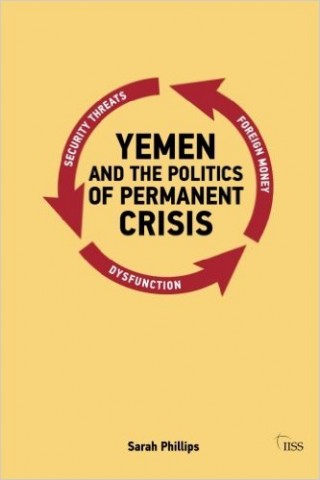Yemen and the Politics of Permanent Crisis
Before the onset of the 2015 Yemeni war, the situation in the country was dire: it was home to one of the world's highest rates of child malnutrition, was chronically food insecure, depleting oil and water resources, corruption and long-term instability. Sarah Phillips explores these dynamics in her work "Yemen and the Politics of Permanent Crisis" (2011). While the situation in Yemen has changed significantly since the publication of this book, it provides insight into the role of security, politics and foreign involvement, and may provide an example of what the end of oil looks like for nations that have not diversified the economy.
Myths:
- "One of the enduring myths about Yemen is that change has been very slow. At first glance, the men wearing their jambiyya, or ornamental daggers, as they walk the streets; the women covered behind a full face veil; and the near ubiquitous presence of the mild narcotic qat, it appears that this is a medieval society quite impervious to change. Nothing could be further from the truth. Change has been rapid and transformative." (p. 14)
Incentives for instability:
- "…the message that was, certainly unintentionally, conveyed to President Saleh during his trip to the United States was that without the threat of al-Qaeda, Yemen could be subject to much more stringent conditions on its domestic politics. Just months after this, in February 2006, 23 al-Qaeda suspects broke out from a maximum security prison in such audacious escape that it is widely understood to have been impossible without inside assistance. Some of those 23 men went on to establish al-Qaeda in the Arabian Peninsula (AQAP), putting Yemen's problem with militant jihadis was [sic] back on the international agenda." (p. 43)
- "There is money to be made from crisis, just as there is leverage to be gained when the state over which you preside is seen to pose a threat to regional and international security. External actors have, therefore, helped to frustrate the emergence of a political alternative by facilitating the regime's short-term rent-seeking behavior and reducing its incentives to risk its survival in the short term by finding longer-term solutions that would improve the livelihoods of its citizens." (p. 130)
Politics and Power:
- "Yemen's petroleum subsidies are popularly, though erroneously, believed by ordinary Yemenis to be a pro-poor initiative. As the figures above clearly illustrate, this is incorrect because the subsidies are a mechanism for transferring the national budget to the power elite." (p. 35)
- "Solutions to problems are not created by recourse to am impartial arbitrator but through the dispersal of resources, benefits and status. These goods are attracted by creating a crisis and then negotiating a solution with the leadership. The norms of the system are reasonably effective at containing, or at least channeling, conflicts but it does not enforce incentives to avoid conflict or, at least, the realistic threat thereof. For a player to maintain their relevance they must maintain their ability to create problems and/or solutions for the president." (p. 65)
Walk away message:
- "The real instability within Yemen is that which affects its vulnerable citizens. What has worked for the Yemeni regime has not worked for its citizens, and the international community needs to decide what it hopes to stabilize through its interventions: the regime or its citizens. In doing so, it should keep in mind that support for the former has not brought stability." (p. 146)
Featured Posts
Tags
Revolution
Globalization
Land
Rural Development
Inequality
Capitalism
Ethnography
Anthropology
Agriculture
Resilience
Politics
South Africa
Civil society
Development
Policy
Colonization
Democracy
Africa
Books
Leadership
Climate change
Gender
Power
Governance
Conflict
Human Rights
Ethics
Islam
Racism
Middle East
Post-doc
Ethiopia
Economics
Colonialism
Culture
Education
Qatar
Food Security
Institutions
Migration
International development
Sustainability
Poverty
Ideology
decolonization
Interdisciplinary
Participation
Fellowship
Development Studies
History

